A Day Outside the City
Just as a house is a culmination of many artists and ideas, documenting is a whole different journey which is equally meticulous and multifaceted. Architectural Journalist, Jaidev Tripathy, tells the rarely heard story behind his storytelling.

FOREWORD
While narrating the construction process behind a mud home she designed in Alwar, Shipra Singhania cuts her sentence off mid-way and takes a long pause, followed by a deep breath. The architect, who now prefers to be addressed as a natural builder, glances towards me as she attempts to frame her thoughts.
“Can I start again from the beginning? I want to describe this Rammed Earth Wall with as much clarity as possible.”
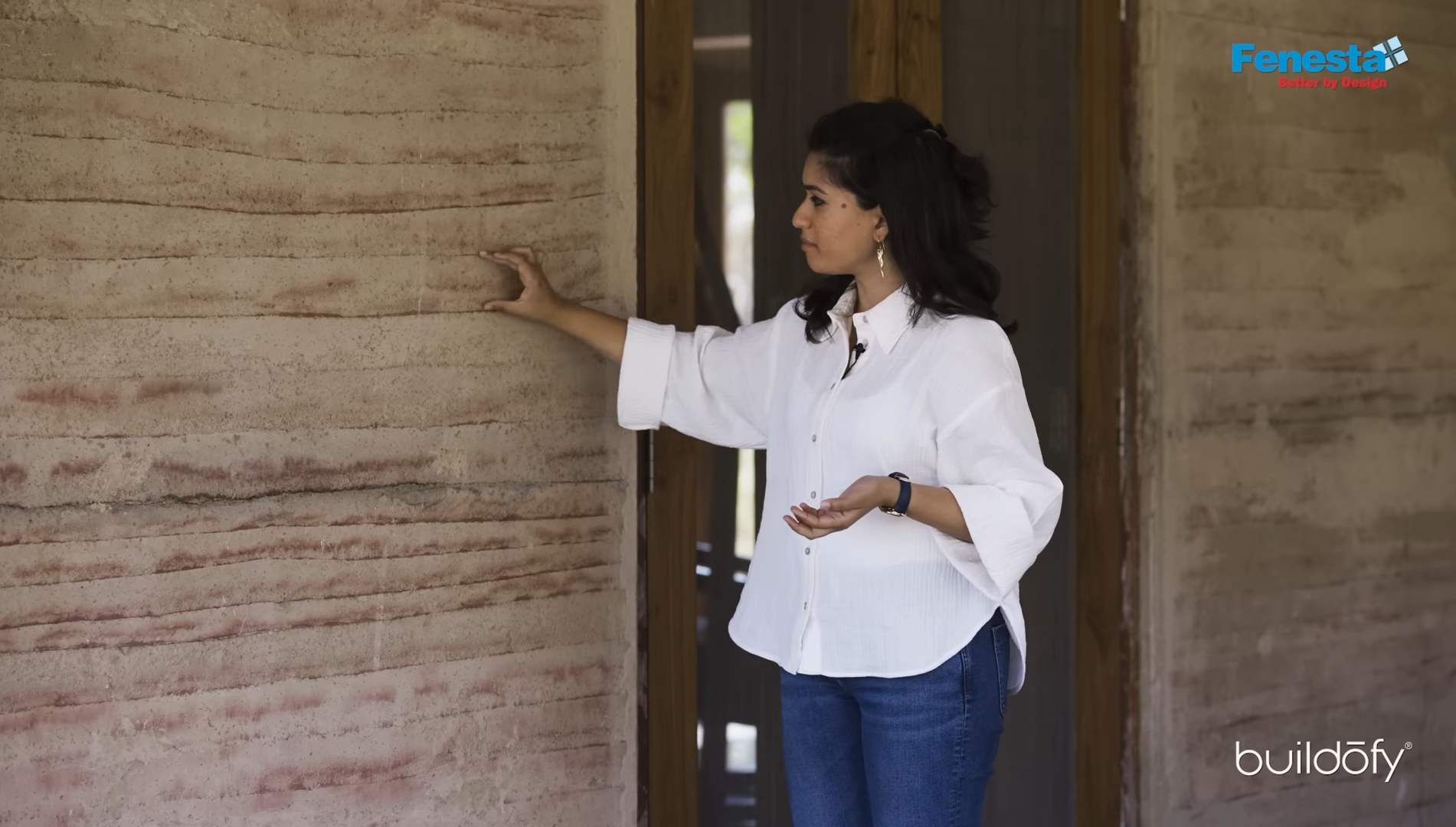
Perhaps inconsequential in the grand scheme of things, these little, in-between moments often reflect an architect’s passion towards their craft. I could sense deep enthusiasm and genuine care towards her creation (a rarity in this field in current times).
For me, these moments are the keys that unlock core memories of my journey in uncovering stories and documenting spaces for Buildofy.
The Mud House wasn’t standard procedure for the architect, who spent her formative years in the field working in Mumbai - one of the fastest cities in the world. While most of her time was spent crafting interior projects in urban settings, Shipra had always been passionate to return to her roots in Alwar and set up her practice. Her passion for local craftsmanship and vernacular architecture led to this moment - a first-time experiment for her mother-in-law, Sunita Sanghi, who is an organic farmer adopting permaculture into the system. Shipra’s experiment was to design a home that reflects her mother-in-law’s principles – meaning that the materials of the home had to come from the earth, and older construction techniques had to be revived to create a sustainable ‘mud kothi’. Getting it built was not easy, since the older construction techniques are difficult to revive in an era of brick and concrete construction.
A year later, in December 2021, Shipra’s experiment was complete. The success of this project kickstarted her pursuit towards being a natural builder.
Perhaps that explains Shipra’s enthusiasm towards the Mud House’s documentation in my very first conversation with her to discuss the shoot as well as the story that needs to be captured. She mentioned the extensive research involved from scratch, as well as the constant and repeated convincing that their usual contractor needed to execute this project – since it was uncharted territory.
It was Shipra’s conviction that led to the birth of this project over anything else.
I finally had my story.
SHOOT DAY
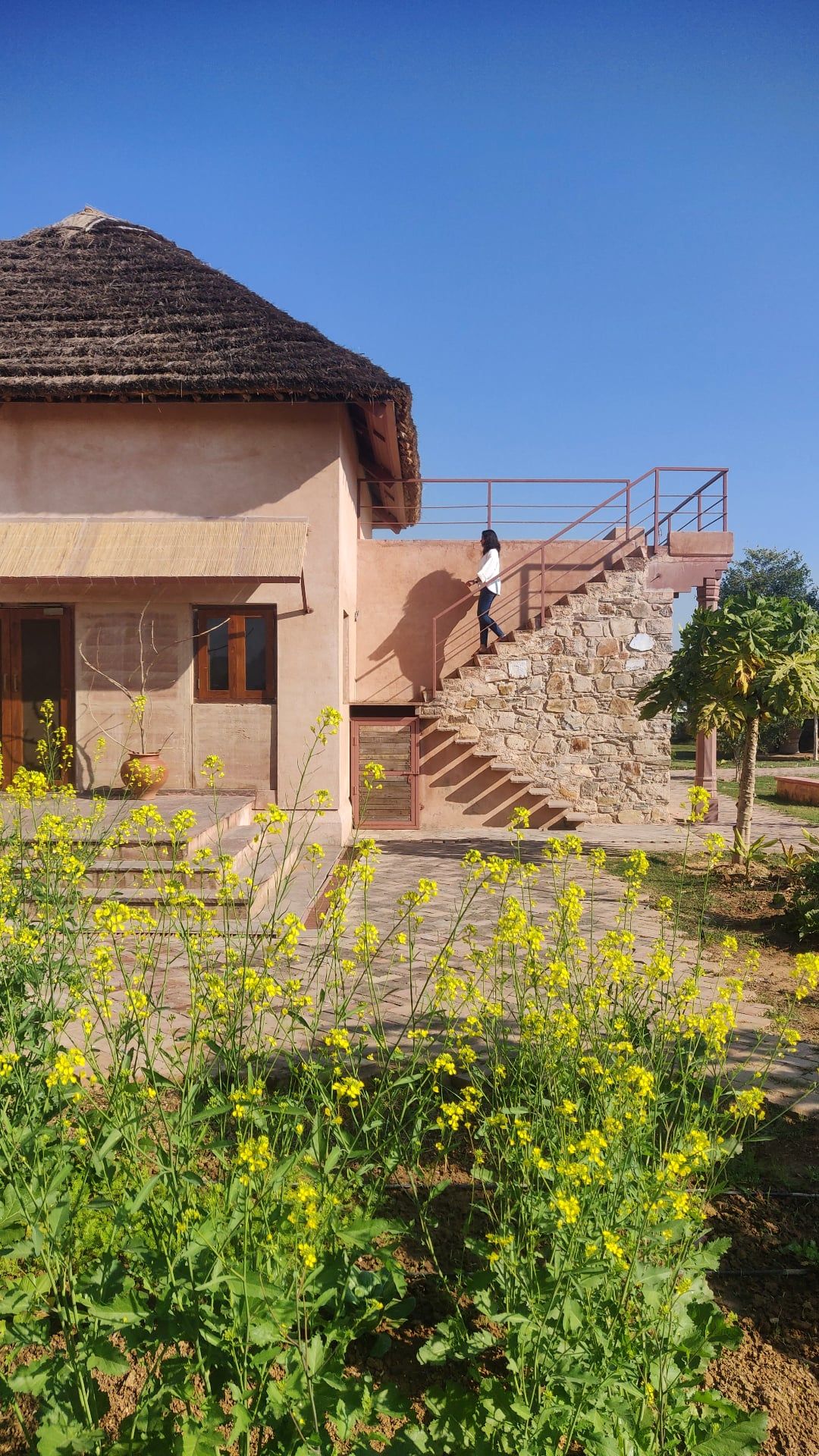
//The Journey
Mud House departs from my usual portfolio of urban homes that I had been documenting for Buildofy until then.
The early morning train journey from Gurgaon to Alwar was spent in deep thought and anticipation. I felt unusually fresh and driven for a December morning, given my passionate dislike for the biting cold winds of the North Indian winters. As the train arrived at the Alwar station, I was greeted by the warm winter sunlight, with chai-wallahs announcing their presence in unison. The day begins.

While visiting a North-Indian town, it is a ritual to opt for auto rickshaws and get a feel of the place instead of the comfort of a cab. A giant perk of working at Buildofy is all the travelling I get to do to places I haven’t formerly been to, and let the journey inspire my work. I embraced the countryside khets sitting inside the auto, enjoying the insightful conversations and stories the driver shared with me. North Indian locals love opening up to visitors. (He specifically told me to approach the locals for directions instead of opting for Google Maps, for I might just get a warm parantha served alongside.)
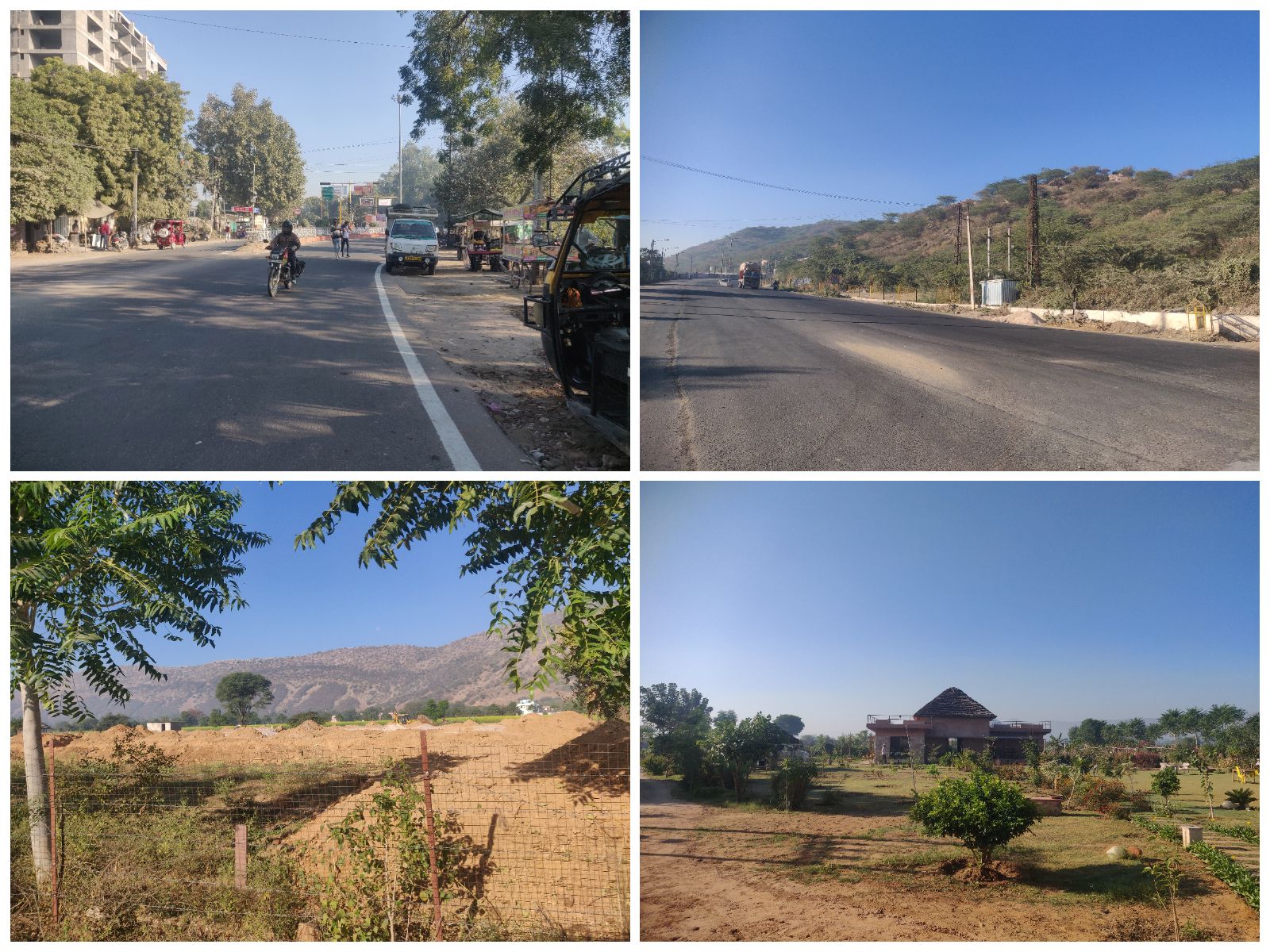
Upon reaching the site, I scanned the landscape until I caught a glimpse of the beautiful mud home blending in with the Aravalli Hills forming the backdrop of this picturesque canvas. “Most important people in Alwar have farmlands here”, said the auto driver before he dropped me there. No wonder – these views justified it.
I wanted to capture not just the home, but also the rich context leading up to the home. I frantically jotted down a few ideas for possible aerial shots before the gates opened.
//Shooting The Space
Of all the wonderful bits that compose a Buildofy shoot, my favourite is interacting with the stakeholders for the first time – my collaborators for the day. I received a warm welcome from Shipra, who was setting the home up along with Mohit - an instrumental part of her design team. Chirag, our cinematographer, was already in the process of visually framing the morning bedroom, promptly bouncing ideas with his camera crew.
Shipra showed me around the compact structure that sat on 2,000 sq ft of land. For me, the magic of a home lies not just in its rooms, but in the semi-outdoor spaces that thrive with activity and connect the residents to nature. Hence, the two verandahs of this home had my attention. In addition to that, the mud walls with their varying textures caught my eye. Each space had its individual persona, yet they utilised minimal materials and felt connected. In a vast 2.5-acre land, the compact structure itself felt grounded.
The rest of the day was busy – frantic yet fun. I fondly recall meeting Shipra’s mother-in-law who surprised Shipra (and me) by visiting. This led to capturing a spontaneous and extremely valuable narration regarding the experience of living in this home, straight from her.
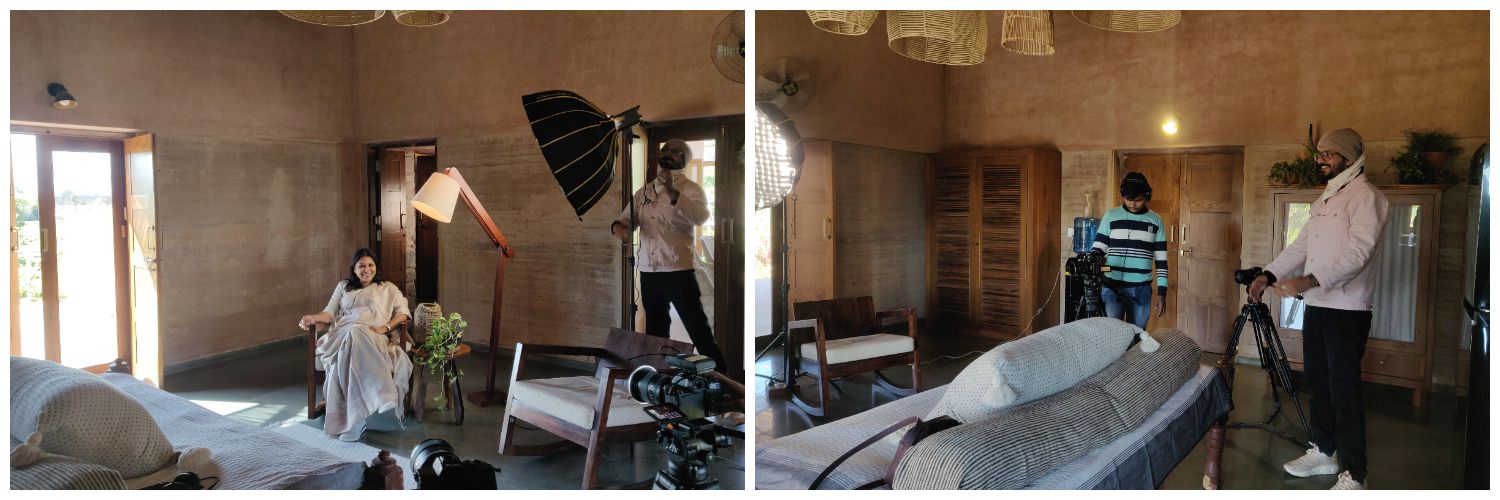
Working alongside Chirag was a treat, who extracted some lovely shots and was open to brainstorming and capturing creative angles. Not only was he enthusiastic and prompt, but he also saw the film through the lens of the edit. This is extremely important as this elevates the quality of footage as well as improves the flow of post-production.
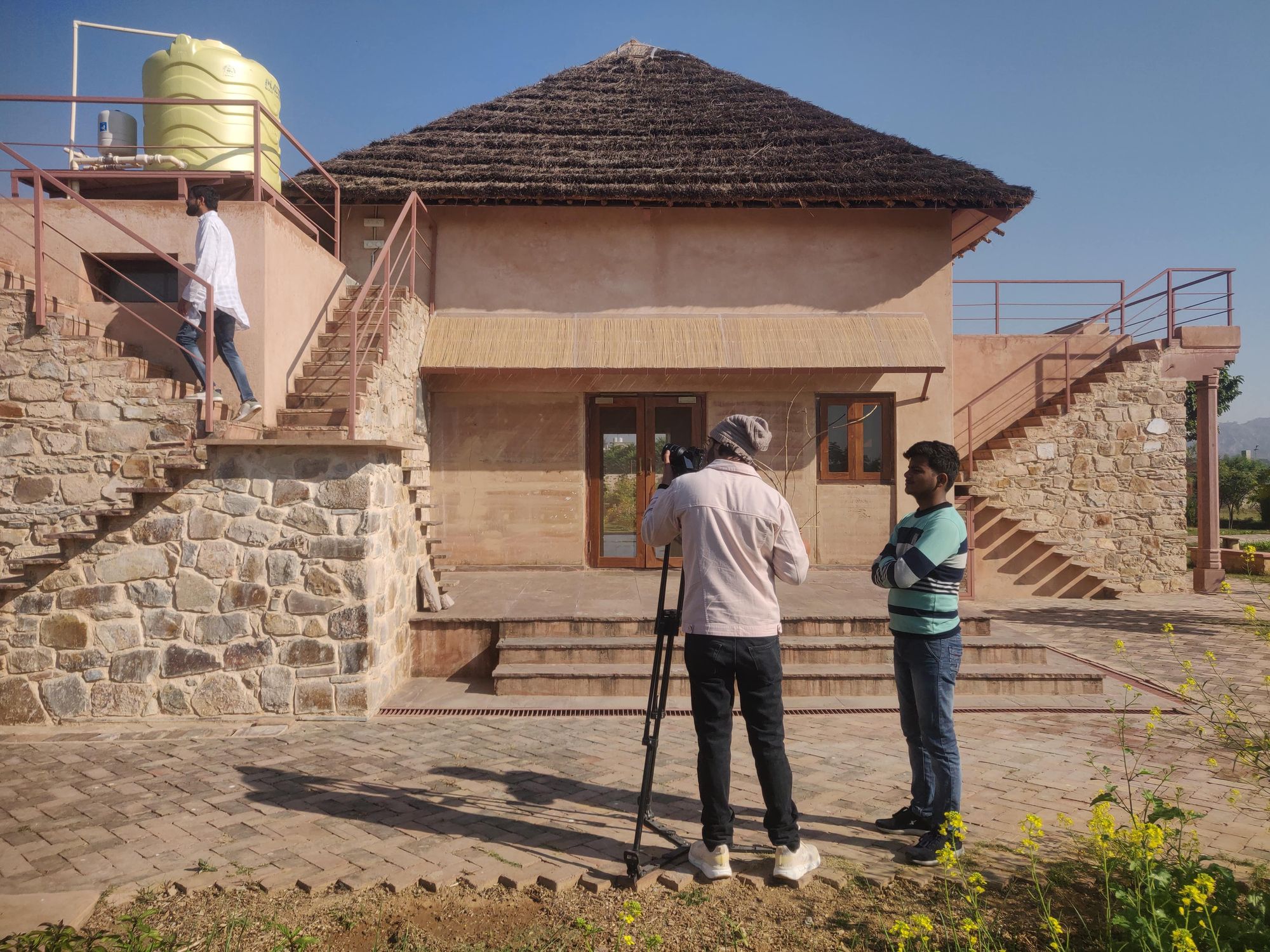
One of the few personal thrills was sitting alongside the driver and guiding him in the process of getting a lovely overhead shot of the car entering the site. After multiple re-takes and a lot of hilarious moments such as the cattle blocking our path in the middle of the perfect take, we captured the rich context of the site just as I had envisioned in the beginning, at its super cinematic best.
With the Western afternoon sunlight already in motion, we captured majority of those spaces before breaking for lunch.
//The Interview
While good food is guaranteed to re-energises souls, lunch breaks excite me because it also becomes an opportunity to know the architect better. As everyone gathers around the lunch table together, different roles intersect, and personal stories are shared; symbolic of a close-knitted family on that particular day.
For an architectural journalist, the process of extracting content is not just restricted to on-camera interviews, but also off-camera interactions with the architect as soon as the day begins. I ensure the ice is broken as soon as I arrive on site, and let Shipra guide me around the home as she explains segments of the design to me. This informality serves two purposes. One – Shipra opens up and a connect between us is established, which helps break down hierarchies or barriers. This catalyses relatively more free-flowing narration for the film. Two – quick early discussions off-camera bring to light genuine information and trivia, of which I often make a mental note. This helps capture related visuals in the shoot, as well as helps Shipra re-collect information during the captured interview later in the day, while as breaks down her design.
Candid, expressive, and detailed narration is the biggest contribution to storytelling, and this one had to do justice to great design. Sustainable homes must not just reach out to an audience, but also connect with them, an idea both Shipra and I aligned with. But with an evening flight for the cinematographers in Delhi and some more spaces left to capture, time was not on our side.
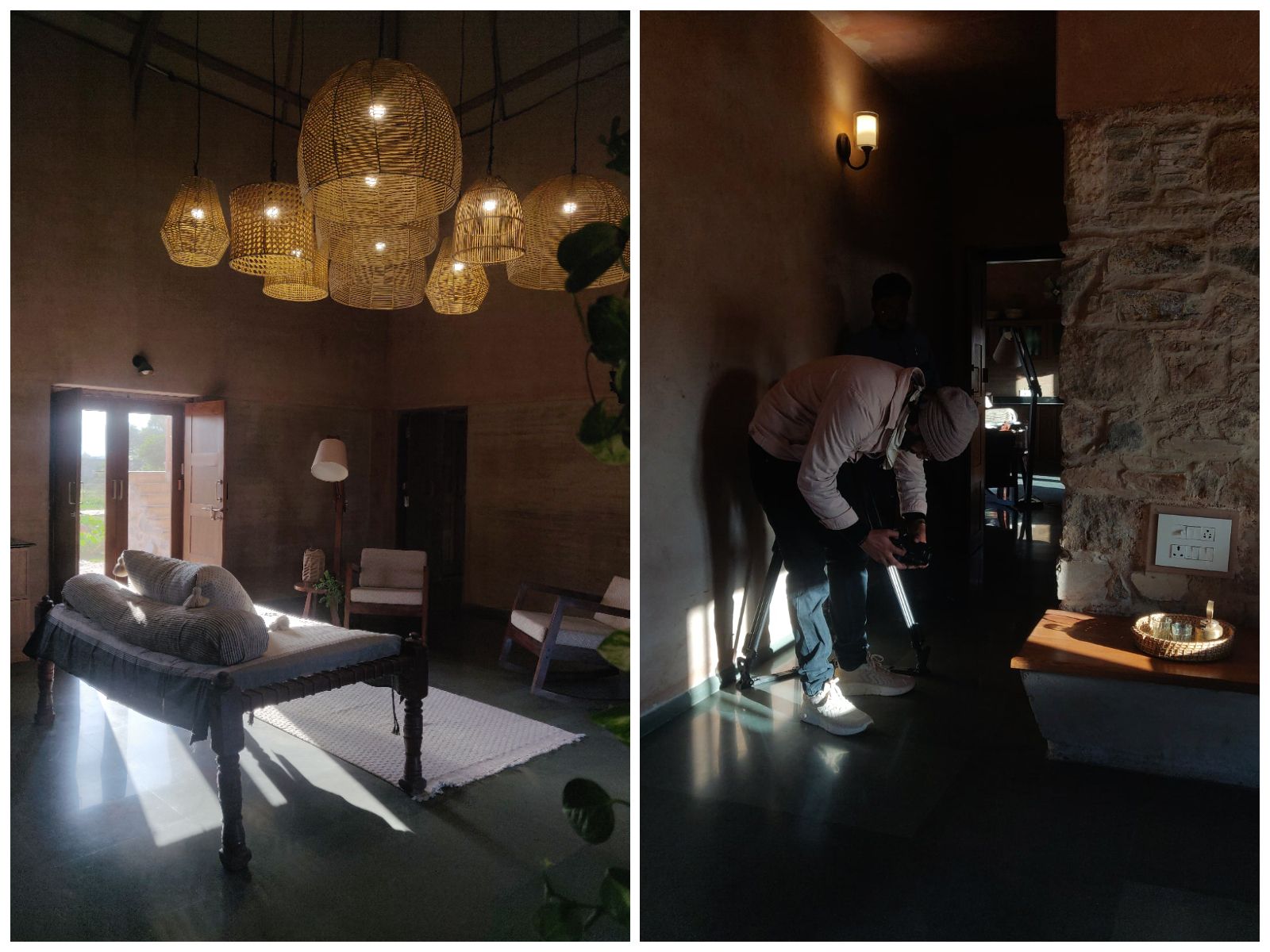
With the help of Chirag, I re-prioritised the remaining 2 hours left of the shoot. An architectural journalist’s attachment to the project and story often means the hesitancy in reprioritising and letting go. But the compromise was necessary, since comfortable time for the interview would result in better narration, and hence a better story. A 15-min window was dedicated to capture some golden light shots which shifting frames, as the rest of the time was reserved for the Shipra’s explanation of the project.
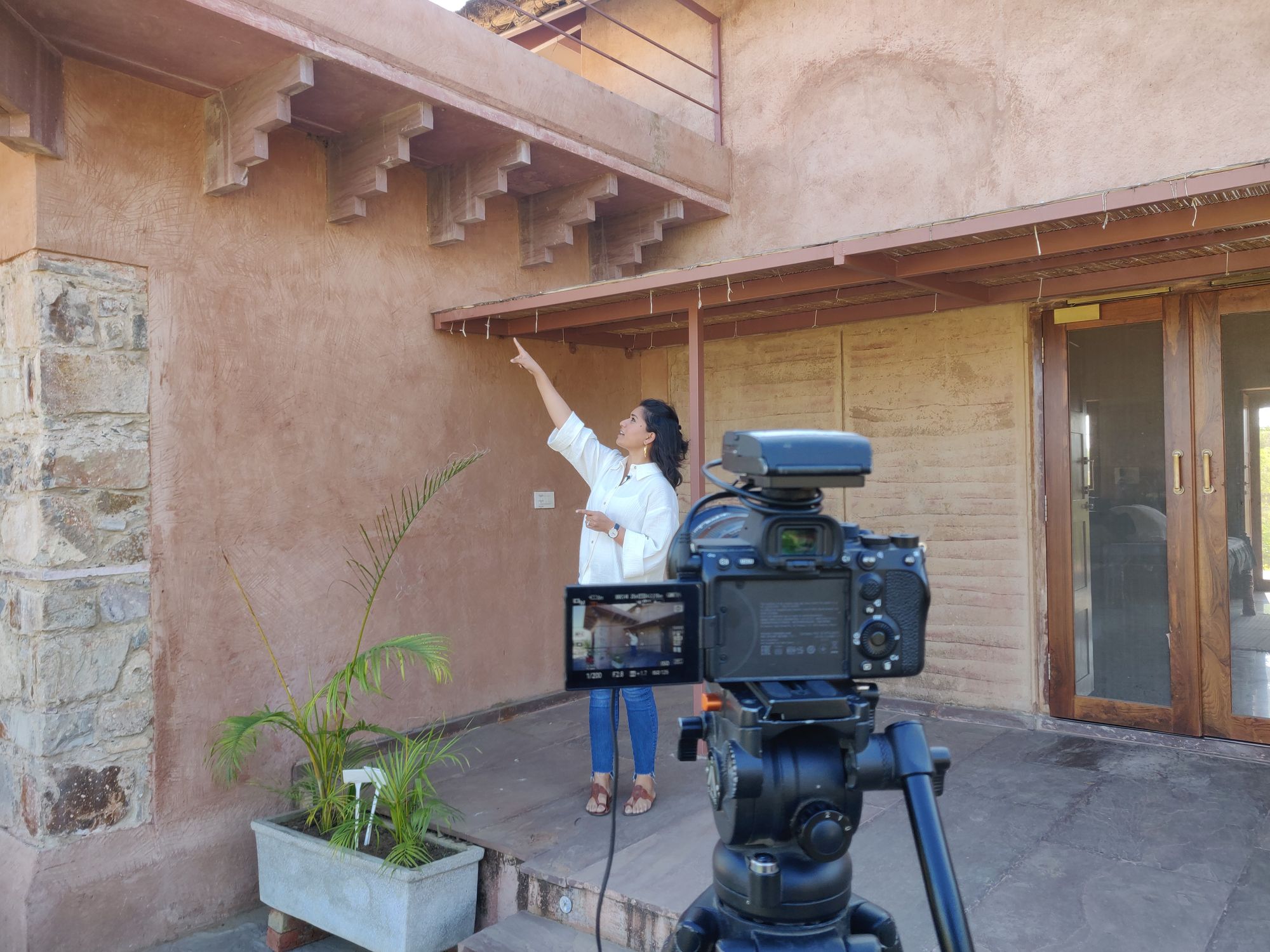
Being her first detailed real-time interview for an architectural project, Shipra was naturally nervous yet excited. These factors usually result in frustratingly extended and surface-level narration that needs extra guidance. Shipra, however, was extremely articulate. She broke each space down along with the intent behind the design, followed by a deep-dive into the construction process of each element without letting the narration wander into the wilderness. When she felt she didn’t do justice to the design through her explanation or stuttered involuntarily, she took a second to compose herself and start from the beginning of the previous sentence. This sensibility towards her narration allowed the interview process to be smooth and enjoyable.
Her narration ended with a smile, and a cheer from the whole team. Before leaving, we drank a last cup of chai in a kulhad - the experience ending on a fulfilling note.
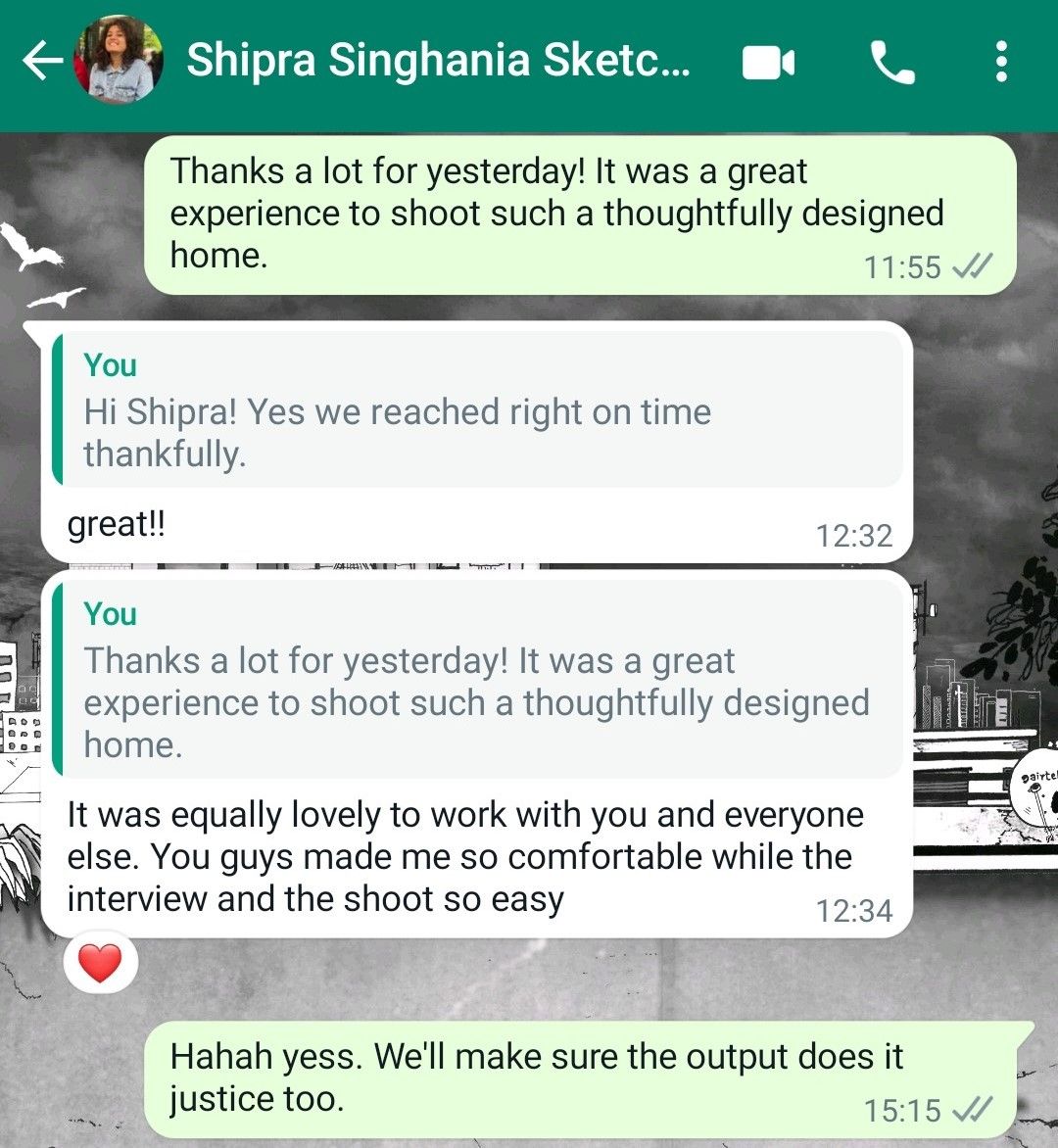
CONCLUSION
The film released on the last day of the first month of the new year, symbolically defining 2023’s journey into architecture with sustainability at the forefront. Like the home itself, bringing this film to life involved a lot of research and intricate levels of post-production (and a lot of time spent getting the colours right!).
And just like the home itself, the process of creating a film that highlights the sustainable design as well as the architect’s process was extremely cathartic, knowing this would inspire several homeowners, students, professionals, and architecture enthusiasts who visit our platform, and the YouTube comment section pours the love this project deserves.
On a rather uneventful week at work, I remember refining the content of the Rammed Earth segment where Shipra pauses midway before repeating. I open my Whatsapp to receive a message from Shipra. She was excited to know the status of the film. Then, she asked me if she wanted anything re-recorded in case she delivered something nervously. Instantly, the moments linked, and I was taken back in time. A sweet coincidence testament to the beauty of architects shaping up built environments in synergy with nature itself.
……….
An exemplary take on sustainable construction techniques, the Mud House strives to be a role model for future architects to rekindle the indigenous building techniques that are both conscious of the environmental context and also revive and boost the local labour and economy. Visit Buildofy to watch the project documentary or click here.
